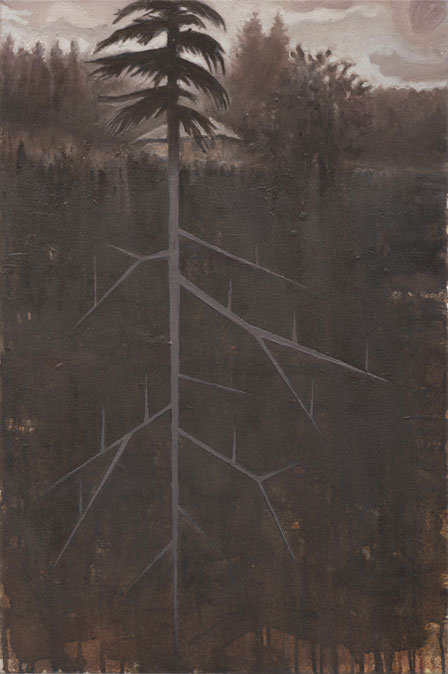Two solo shows
dal 26/6/2009 al 29/8/2009
Segnalato da
26/6/2009
Two solo shows
Kunstverein Braunschweig, Braunschweig
In his portraits, interiors, and landscapes, Berlin-based artist Armin Boehm uses a technique in which he combines media such as glaze, drippings, metal dust, and thickly applied oil. Anita Di Bianco works with film, video, and print media. Her short films pursue strategies of the restaging of works by well-known writers such as Winfried Georg Sebald or Gertrude Stein and in this way destabilize the notion of inviolable authorship.

ARMIN BOEHM
In his portraits, interiors, and landscapes, Berlin-based artist Armin
Boehm [*1972] uses a technique in which he combines media such as glaze,
drippings, metal dust, and thickly applied oil. He initially formulates
his pictorial elements in natural coloration. Layer by layer the palette
becomes darker. Ultimately, only isolated sparks of shimmering color
attest to the polychrome ground. Yet Armin Boehm's works are not only
multilayered in terms of form; their content is just as profound, indeed
ambiguous. Because the painting process-a constant adding and
eliminating-is, as it were, also a mirror of his interest in presence and
absence, the material and the metaphysical, the figurative and
transcendence and their transitions. It is precisely these scientific and
human intermediate states that Boehm examines in his pictorial work: it is
about border zones on the line between science and parascience, religion
and occultism.
Boehm's interiors are sometimes inspired by ritually
charged spaces; the models for his landscape paintings are aerial views of
military bases, terror camps, or research centers. The artist pursues
mathematical and physical phenomena in his depictions of planetary
space-comets or constellations. One even encounters central figures from
the field of astronomy in his portraits, a discipline in which the
fundamental metaphysical interest of scientific research reveals itself in
a particularly lucid way. As of late, Boehm's works have increasingly
included abstract forms as well. Geometric shapes out of metal foil have
in part been integrated into his paintings and lend many of them an almost
alchemistic appearance; now and then, abstract pictures also develop
within the context of figurative series. Another one of his concerns is to
expose the connection between the art of modernity and spiritualism.
Because when established religions became less important within the scope
of the avant-garde's process of secularization in the early twentieth
century, parareligious, occult, and esoteric teachings became all the more
influential. Theosophy and anthroposophy, for example, also exercised a
great amount of influence on the development of abstract art. An aspect
that has fallen into oblivion which Boehm's works look into in a subtle
way.
A comprehensive catalogue (German/English) is being published on the
occasion of the exhibition that includes an interview with Sarah Frost as
well as contributions by Martin Engler, Gregor Jansen, Veit Loers,
Gabriele Sand, and Hilke Wagner. ISBN 978-3-940953-20-9
------
ANITA DI BIANCO
Ghostwriter
The American artist Anita Di
Bianco (*1970 in New York) works with film, video, and print media. Her
short films pursue strategies of the restaging of works by well-known
writers such as Winfried Georg Sebald or Gertrude Stein and in this way
destabilize the notion of inviolable authorship. The text selection is
analytical, the images purist: Di Bianco's remakes make hidden structures
visible and open up new avenues of interpretation. The artist's most
recent works-'Com Viet' (2008) as well as the two-channel video
installation of the films 'Du réve et des drogues' and 'Ballad in
Plain D' with the title 'Der Versteller' (2007)-will be shown at the
exhibition in the Kunstverein's 'Remise'.
Artist Talk
with Armin Boehm: Thursday, August 20, 2009, 7:00 p.m.
with Anita Di Bianco: Thursday, August 6, 2009, 7:00 p.m. (in English)
Image: Armin Boehm: Ig Hul, 2009, 60 x 40 cm. Courtesy: Meyer Riegger, Berlin / Karlsruhe.
Press contact:
Katrin Meder Tel: 0531 49556 info@kunstverein-bs.de
Kunstverein Braunschweig
Lessingplatz 12 - Braunschweig



